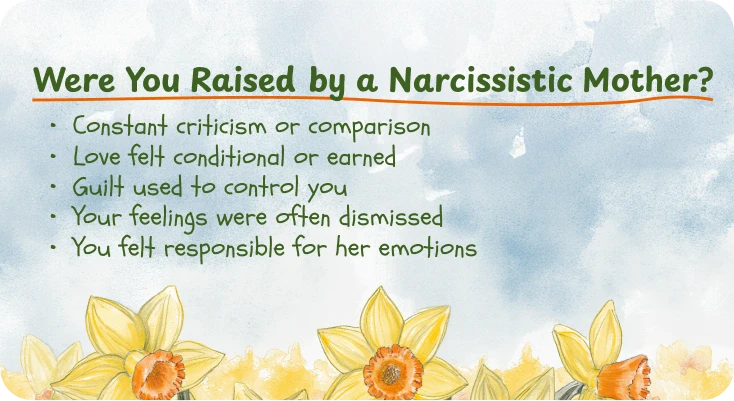It’s your birthday dinner, and, like always, it’s the “All About Mom” show. Her accomplishments, challenges, and thoughts dominate the conversation, while your needs and achievements are overlooked. You may be empty, frustrated, and full of self-doubt, but you can’t do anything because of your emotional reliance on your mother. This type of narcissistic mother-daughter relationship can leave a long-term psychological and emotional impact on your mental health.
How do you figure out if you grew up with a mom with narcissistic tendencies? Check out this list to see if you are one of the daughters who have a narcissistic mother.
10 Symptoms of Daughters of Narcissistic Mothers
Let’s go over some of the signs you might notice in yourself as a daughter of a narcissistic mother.
1. Self-doubt and low self-esteem
Constant criticism and lack of validation from a narcissistic mother during childhood can erode a daughter’s confidence and self-esteem, according to research. [1] As a result, making decisions and feeling good about yourself later in life can be difficult when you’ve internalized so many negative beliefs from your caregiver at a young age.
Example: Jane, a talented artist, is hesitant to show her work in galleries because her mother dismisses her efforts, saying, “You’ll never be as good as real artists.”
2. Chronic guilt and shame
Narcissistic mothers can make their daughters believe that they’re constantly making mistakes, even when they’re not. Or her daughter is a mistake herself. This is more than just low self-esteem; it is a widespread, internalized belief that you are fundamentally selfish or flawed because you have your own needs, desires, and feelings.
Why does this happen? Narcissistic mothers can use guilt and shame as control mechanisms. Children who express themselves freely may be labeled as “too sensitive,” “ungrateful,” or “difficult.”
Even when she has done nothing wrong, the daughter begins to doubt her emotions and apologize for who she is. Feelings like “I shouldn’t have said that” can keep running through your head.
You can feel ashamed and guilty whenever they try to be different, emotional, independent, or assertive.
A mother could also make fun of her kid’s feelings, downplay her achievements, or feel envious instead of proud. Even things that should feel safe, like asking for help or letting someone know you’re sad, become reasons to be laughed at or rejected by narcissistic mothers.
3. Difficulty saying no
Another symptom of daughters with narcissistic mothers is a lack of boundaries. Children of narcissistic parents may never learn how to set healthy boundaries and form healthy relationships because their mothers may have overstepped them. This makes them vulnerable to emotional manipulation or being taken advantage of in relationships later in life.
Do you struggle with self-doubt or people-pleasing, especially around female authority figures?
4. Terrified of being left alone
The deep-seated fear of abandonment is another common experience for adult daughters of narcissistic mothers. Daughters who receive inconsistent love and attention from a narcissistic mother may feel insecure and constantly seek approval. They may go to great lengths to avoid rejection, even if it means compromising their own needs and own values.
For example, people remain in a toxic relationship because they fear that if they leave, they will be left alone, just as their mother used to give them the narcissistic silent treatment for minor mistakes.
5. Over-identification with success/fear of failure
Growing up with unrealistic expectations and a constant need for success can lead daughters of narcissistic mothers to strive for perfectionism in everything they do. But when they inevitably fall short and make even a minor mistake, they experience intense self-loathing and feelings of failure. This desire for perfection can manifest in a variety of areas of life, including academics, careers, adult relationships, and appearance.
6. Putting others first always
Adult daughters of narcissistic mothers can develop people-pleasing behavior, too. It is possible because they have been “trained” to prioritize their mother’s needs and feelings over their own from a young age, and this pattern can continue into adulthood.
These tendencies may help explain why some individuals attract narcissists, as it is particularly challenging for children of narcissistic mothers to assert or prioritize their own emotional well-being.
7. Overly reliant on others
Codependency in relationships might be another symptom of daughters of narcissistic mothers. The enmeshed relationship with a narcissistic mother affects unhealthy patterns of a codependent relationship in later life.
Daughters of narcissistic moms may struggle with autonomy and independence, seeking external validation and distorted self-importance. For example, Rebecca is hesitant to make decisions on her own and constantly seeks validation from her partner, just as she did from her mother.
8. Insecure attachment style
Insecure attachment styles stemming from attachment trauma are also prevalent among daughters of narcissistic mothers. Children of narcissistic mothers may develop a disorganized attachment style as a result of their inconsistent and invalidating emotional experiences, which may hinder their ability to build trustworthy and healthy relationships in the future.
Someone, for example, is concerned that if their partner goes out with friends, they will never return because of their mother’s unpredictable displays of closeness, security, and love.
9. Trouble trusting others
Dealing with narcissistic mothers and living in an unpredictable and emotionally volatile environment can keep daughters of narcissistic mothers on high alert, making it difficult for them to relax and feel safe. Even when things appear to be going well, they may anticipate emotional turmoil and wonder, “Why am I so sensitive to perceived threats?”
For example, a daughter of a narcissistic mother may constantly look around the room for any signs that someone disapproves of her actions. They have extreme self-criticism and are unable to relax, just as they did at home to avoid their narcissistic mother’s outbursts.
10. Bottling up feelings
Emotional suppression is another common coping mechanism for those growing up with narcissistic abuse. Adult daughters of narcissistic mothers may have learned to hide their emotions to avoid their mother’s disapproval or her lack of compassion and support towards them. For some people, this can make it difficult to express emotions or have reactive emotional outbursts, which can affect their relationships and mental health in general.
You might hide your emotions, even with close friends, because you’re afraid they’ll think you’re weak or needy. This can happen because a narcissistic parent thought our feelings were “over the top.”
The dynamics discussed can sometimes be relevant to relationships with narcissistic mothers-in-law. Many of the symptoms and challenges experienced by daughters of narcissistic mothers, such as difficulty setting boundaries, feeling invalidated, and struggling with self-esteem, can also be present in relationships with mothers-in-law who exhibit narcissistic traits.

What is a Narcissistic Mother?
Narcissistic mothers tend to be consumed with their self-image and the achievements of their kids, while they have fragile self-esteem and chronic guilt and shame. Furthermore, the narcissistic mother frequently views her daughter as no more than an extension of herself.
Narcissistic mothers are really good at demanding praise and attention, but have difficulty understanding their children’s feelings. They almost don’t see them as separate people with their needs and wants. This can be just traits of narcissistic mother behavior or, sometimes, be officially diagnosed as a mental health condition, Narcissistic Personality Disorder (NPD).
Children of narcissistic mothers or narcissistic mothers-in-law may employ emotional abuse, neglect, and emotional manipulation toward their daughters. For example, mothers might constantly criticize their daughters, or they might engage in guilt trips when narcissistic mothers expect you to spend time with friends instead of with them.
According to a study, children who experience parental narcissism are more likely to develop behavioral or emotional disorders, even at a young age. [2] Another 2023 study says that parental narcissism leads to anxiety and depression in children via scapegoating. [3] It’s not uncommon for daughters of narcissistic mothers to develop anxiety disorders or struggle with depression as a result.
They may feel unmotivated and question themselves, wondering, “Am I lazy or depressed?”. Growing up in such an environment can be emotionally turbulent and stressful for a daughter’s mental health, potentially impacting your emotional well-being and preventing you from building healthy relationships.
Karyl McBride, the author of “Will I Ever Be Good Enough?: Healing the Daughters of Narcissistic Mothers,” continues this thought,
Signs of Mother’s Narcissism
Narcissistic mothers often:
- Think they’re way more important than others.
- Crave constant attention and praise.
- Don’t really care about how others feel.
- Feel entitled to special treatment.
- Use others to get what they want.
- Get jealous easily or think everyone’s jealous of them.
- Act arrogant and superior.
How to Know If Your Mother Is a Narcissist
When discussing the impact of narcissistic mothers on their children, it’s important to recognize the different types of narcissistic mothers, as their specific behaviors can prolong childhood trauma well into adulthood. Moms with narcissistic traits can be categorized as adaptive or maladaptive. [3]
Adaptive narcissists are ambitious and self-assured; they value themselves, but they are not manipulative. This is completely okay, and many of us have this embedded in our core personalities. Maladaptive narcissists, on the other hand, are overly sensitive, crave attention, and exploit others.
So, how do narcissists treat their children? While all narcissistic parents are self-centered and lack empathy, they express these traits in various ways:
- Covert narcissistic mother. They often appear kind and caring but manipulate behind the scenes. They may play the victim and guilt-trip their children, but at the same time, undermine their daughter’s self-esteem. You could hear such things from a covert narcissistic mother, like, “You know I only want what’s best for you, dear. Trust me.” (While undermining your decisions).
- Overt narcissistic mother. Such mothers are openly self-centered, demanding, and critical. An overt narcissist mom might constantly talk about her achievements while dismissing her child’s accomplishments. Things narcissistic mothers may say: “Look at all the awards my child won! I’m such a great mother!” or “You’re lucky to have me as your mother. You wouldn’t be anything without me.
- Communal narcissistic mother. This type of mom may use good deeds and charity work to boost their ego while neglecting their children’s emotional needs. Others might perceive her as highly compassionate or dedicated to the community, whereas her own family members feel like they get the worst treatment from her. Being raised by a communal narcissist, you have probably internalized something like, “I’m too busy helping others to deal with your little problems right now.“
- Malignant narcissistic mother. The most severe form. These are narcissistic women who are manipulative, abusive, and vindictive. Such mothers may use their children as pawns and may even try to harm them. Examples of what she might say to her child are, “I’ll tell everyone your secrets if you don’t do what I say,” or, “You’re nothing but a burden to me. I wish I had never had you.”
All of the examples provided are examples of gaslighting, a manipulative tactic that makes someone doubt their sanity, memories, or perception of reality.
Important Note: These are just examples, and the behavior of narcissistic parents can vary greatly. Some of the types can overlap.
Why Might Your Mom Be Narcissistic?
Not always are narcissistic mothers malicious or purposely trying to hurt their children. You may ask, “Why are moms so mean, then?” It’s more like a deeply rooted habit of self-preservation, and a narcissistic mother struggles with a skewed view of self-worth, which drives their behavior.
It always stems from their childhood, where they might also be belittled by their parents or be shown love only if they achieve something or behave well. Narcissistic mothers can be low self-esteem daughters of their narcissistic parents.
But do narcissistic mothers love their children? Well, they have difficulty experiencing and expressing love in the way most people understand it. While they may profess to love their children and even believe they do, their passion tends to be conditional and transactional.
How to Heal Daughters of Narcissistic Mothers?
Recovering from the effects of having a narcissistic parent, especially those who have narcissistic personality disorder, can be incredibly challenging, but remember that you’re not alone.
Expert Insight
You may find it unnerving to recognize narcissism in your own mother as an adult. You might even wonder how you missed this, particularly if the abuse now seems so apparent. It’s important to remember that narcissism can be insidious and that children developmentally look up to their parents- even when their parents are hurting them. This is why the grief associated with seeing your mother for who she is can feel so jarring.
Nicole Arzt
Mental health professional
1. Improve self-awareness
The first step towards healing is recognizing and accepting the reality of what happened. Acknowledge how your parents’ narcissistic behavior has affected you emotionally, mentally, and perhaps even physically.
If you find it helpful, consider writing down all your thoughts and feelings. You can title it “a letter to my narcissistic mother” (though you don’t have to send it). This can be a painful process, but it’s an essential foundation for moving forward. Reclaiming your feelings and expressing emotions is a step toward individual empowerment and better mental health.
2. Set healthy boundaries with a narcissistic mother
Establishing healthy boundaries from your mother and her narcissistic abuse, even if it means limiting contact, may be vital for your well-being. This might involve saying no to unreasonable demands, protecting yourself from their manipulation, or even temporarily distancing yourself from her if necessary. It’s about prioritizing your own feelings and needs and creating a safe space for yourself to heal.
3. Develop your authentic self
Discovering your true self after a narcissistic childhood requires releasing your identity from the masks of the peacemaker, achiever, and invisible self that you were compelled to wear.
Here’s how to begin:
- Journal honestly, not for performance, but for self-awareness. Write what you want, what your own needs are, what angers you, what excites you, even if it feels unfamiliar or messy.
- Ask yourself questions that your parents never allowed, such as “What do I believe in?” and “What kind of life do I want?”
- Pay attention to what energizes you vs. what feels like self-abandonment. Even minor daily decisions (food, clothing, and music) can help you reconnect with your true self.
- Try new things without fear of disapproval. You don’t need permission to be curious, creative, or imperfect.
Try the Breeze app to track your emotional patterns, identify hidden triggers, and explore your inner world with daily reflections and personalized insights. It helps you tell the difference between inherited shame and real experience.
4. Take extra good care of yourself
Engage in activities that bring you joy and fulfillment, prioritize physical well-being and mental health through exercise or movement, meditation, and self-compassion. It takes time, but start rebuilding your self-esteem and self-worth while lessening the narcissistic mother effect.
5. Seek professional support if needed
Family therapy or individual counseling can be immensely beneficial. A therapist can provide guidance and validation, helping you process your emotions and develop coping mechanisms. Look for someone who specializes in attachment trauma and/or narcissistic parenting. Don’t be hard on yourself if healing takes time.
Sources:
- van Houtum, L. A. E. M., Will, G. J., Wever, M. C. M., Janssen, L. H. C., van Schie, C. C., Tollenaar, M. S., & Elzinga, B. M. (2022). Adolescents’ affective and neural responses to parental praise and criticism. Developmental cognitive neuroscience.
- Berg-Nielsen, T. S., & Wichström, L. (2012). The mental health of preschoolers in a Norwegian population-based study when their parents have symptoms of borderline, antisocial, and narcissistic personality disorders: at the mercy of unpredictability. Child and adolescent psychiatry and mental health
- Vignando M, Bizumic B. Parental Narcissism Leads to Anxiety and Depression in Children via Scapegoating. J Psychol. 2023;157(2):121-141.
- Cai, Huajian & Luo, Yu. (2018). Distinguishing Between Adaptive and Maladaptive Narcissism.
Disclaimer
This article is for general informative and self-discovery purposes only. It should not replace expert guidance from professionals.
Any action you take in response to the information in this article, whether directly or indirectly, is solely your responsibility and is done at your own risk. Breeze content team and its mental health experts disclaim any liability, loss, or risk, personal, professional, or otherwise, which may result from the use and/or application of any content.
Always consult your doctor or other certified health practitioner with any medical questions or concerns
Breeze articles exclusively cite trusted sources, such as academic research institutions and medical associations, including research and studies from PubMed, ResearchGate, or similar databases. Examine our subject-matter editors and editorial process to see how we verify facts and maintain the accuracy, reliability, and trustworthiness of our material.
Was this article helpful?






